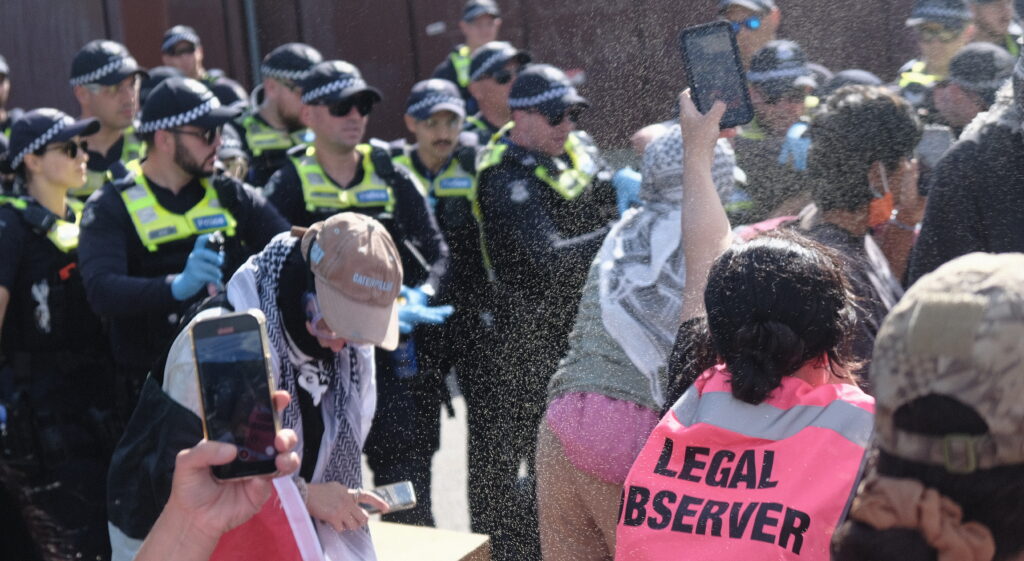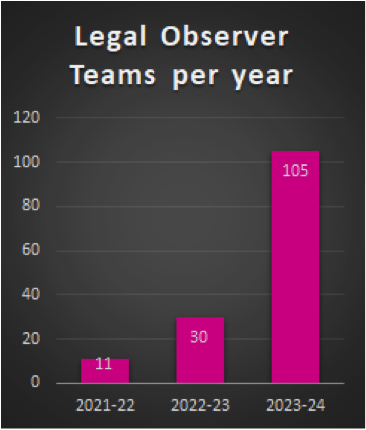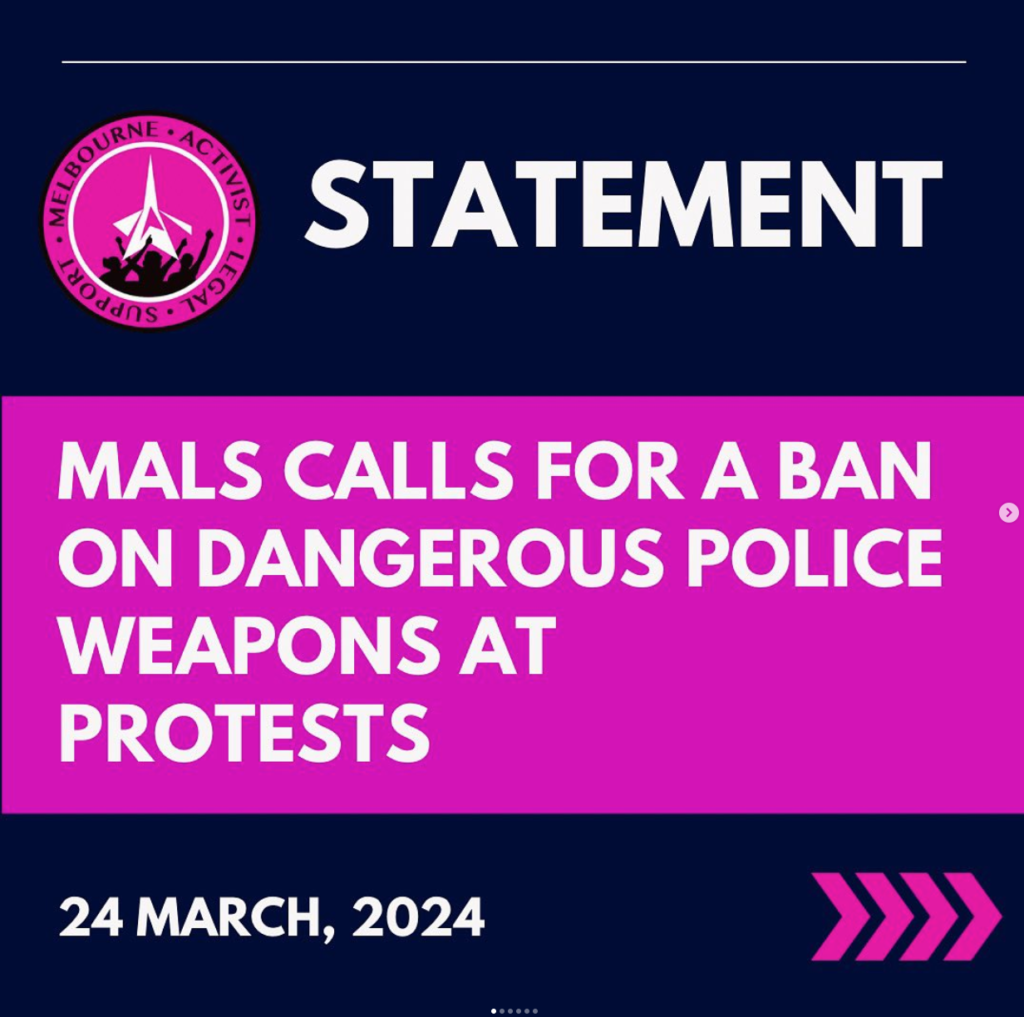Annual Report 2024

This is the third annual report to members since Melbourne Activist Legal Support (MALS) became an Incorporated Association in 2021.
Acknowledgment of Country
MALS acknowledges and pays respect to Country and Elders of First Peoples wherever we work across the lands now known as Victoria. We acknowledge that the police and legal system in this country remains a core component of colonisation, which continues to disproportionately target and impact First Peoples. All activists in Australia today owe a huge debt to Aboriginal activists throughout our history who fought for basic human rights, social, legal and political change.
Why we exist
MALS exists because stronger activist legal support builds stronger and more resilient social movements. Stronger social movements mean a more robust and sustainable democracy, a more accountable and representative political system, and a more equitable and just society for everyone.
The objectives of MALS are to:
- support activists in defending their own civil and political rights
- help maintain an open political space for protest in Victoria
- train and field Legal Observer Teams
- monitor and report on public order policing
- provide training and advice on legal rights, police powers, and activist legal support structures
- develop and distribute legal resources for protest movements
- maintain collaborative links with community legal centres, law firms and local, national and international human rights agencies.
Statement on Impact
Our on-the-ground presence
The unfolding horror in Gaza and the slaughter and starvation of its people is a truly defining moment in the history of this century. Since the start of October 2023, there have been weekly protests around the world, including every Sunday in Melbourne’s central business district, calling for an end to the relentless killing of Palestinian civilians, and a halt on the export of weapons-related equipment to prevent what the International Court of Justice has called a plausible case of genocide. This extraordinary grassroots movement, led and organised by communities of colour, has proven to be one of the most sustained, powerful, and relentlessly persistent protest movements we have seen in this country for decades.
MALS has fielded Legal Observer Teams at almost every one of the weekly Palestine solidarity demonstrations since October 2023.
As well as weekly protests, MALS have fielded teams to the plethora of blockades, pickets and civil disobedience actions against weapons manufacturers, Israeli-owned shipping companies on the docks of Melbourne, at suburban council meetings, the offices of Members of Parliament, and at companies seen to be complicit in the genocide. The widespread adoption of direct action and civil disobedience across Australia in solidarity with the Palestinian people has seen MALS field observer teams at sometimes multiple protest events each week, and some that span multiple days.
The months-long solidarity encampments, sit-ins and building occupations at five Victorian universities over April to June 2024, saw MALS regularly deploying teams of legal observers to the University of Melbourne Parkville campus as well as visits to Monash, and RMIT Campus’s. In May 2024 MALS joined with human rights organisations across the country calling upon Vice Chancellors to ensure their responses to encampments uphold the right to protest and refrain from inappropriate suspensions of students, penalties on protestors or police intervention.

In April 2024 member organisations of the International Network of Civil Liberties Organizations (INCLO) issued an important statement on the protection of the rights to protest in the fight against antisemitism and Islamophobia. Backed by human rights experts around the world, the statement asserted that in moments of grave social crisis, protests are a vital safety valve giving people an outlet to express their concerns. By responding to protests in ways that unlawfully oppress or discriminate, governments and police only increase hostility and hinder the resolution of religious, ethnic and other social conflicts. For this reason, MALS has consistently spoken out about the many misguided and oftentimes unlawful attempts by police, officials, and politicians to demonise, stigmatise and criminalise this important protest movement.
MALS has always worked across movements and we place ourselves at protests wherever there is a possibility of police action impacting upon rights. We fielded Legal Observer Teams at Extinction Rebellion climate protests, union pickets, refugee rights rallies, the School Strike for Climate, the ASEAN Summit protests, and at the large nationwide rallies against violence against women. We monitored the policing of the annual 420 protest for the decriminalisation of cannabis, the 13th annual Slutwalk, and the annual Invasion Day march. We have also continued the careful monitoring of how police respond to the numerous protests countering far-right and anti-Trans mobilisations as well as how police respond to the growing number of neo-Nazi actions appearing across Victoria.
We choose to field teams where and when we think they will be most needed, and when activist groups have requested our presence. At so many critical protests, where activists have faced very real risks of police violence, abuse or discriminatory police conduct we have had legal observers present, assisting, monitoring, and gathering evidence.

Between July 2023 and June 2024, MALS fielded an unprecedented 105 Legal Observer Teams involving 516 individual legal observer shifts. This represents more than triple the amount of work of the previous year. (see graph) We acknowledge the amazing effort of each and every one of our volunteer legal observers.
Between July 2023 and June 2024, there were 33 requests for Legal Observer Teams that we could not field either due to capacity or timing.
Behind the scenes of our on-the ground presence is a huge range of organising, researching, briefing, risk assessment, preparation and training. After each team there is an enormous amount of reporting, evidence gathering and logging, documenting and sometimes producing and distributing detailed reports or Statements of Concern. After protests where we observe serious police misconduct, we can spend many weeks and sometimes months of referrals, reporting and advocacy.
In July 2024, the United Nations Human Rights Council called upon all States ‘to pay particular attention to the safety and protection of those observing, monitoring and recording protests, including human rights defenders, lawyers, journalists and other media workers, taking into account their specific role, exposure and vulnerability.’ Victoria Police, as the coercive arm of the Victorian government, has failed to respect the role, independence and safety of legal observers multiple times over the past 12 months.
The independent monitoring of police is a critical element of human rights protection. Throughout the year, we have taken every opportunity to assert the rights of journalists, human rights defenders and independent observers to access protest spaces without being hindered or obstructed, or limited in exercising their functions. We thank the growing number of organisations, agencies, churches and unions throughout Australia who recognise and help assert our rights to safely and effectively monitor police at protest events.
The independent monitoring of police is a critical element of human rights protection….We thank the growing number of organisations, agencies, churches and unions throughout Australia who recognise and help assert our rights to safely and effectively monitor police at protest events.
Strengthening advocacy
Our capacity to gather evidence, feed into police accountability processes and to strengthen human rights advocacy has continued to grow. MALS has been able to draw together statistics, evidence and extensive testimony from a wide range of protest participants, frontline legal support organisations, and combine this data with our own eye-witness evidence from legal observers. Our ongoing monitoring allows us to identify patterns of behaviour, changes in police approaches over time, and where failures to meet human rights standards are systemic.
This year MALS has released four detailed Statements of Concern (SoCs), as well as five shorter ‘Points of Concern’ highlighting serious incidents of police misconduct or failure to uphold human rights. This substantial increase on previous years is both a result of our expanded presence at far more protest events, and our growing capacity to produce these statements.
Our Statement of Concern regarding the policing of the 3-day Webb Dock Picket in January 2024 was raised in the Victorian Parliament, referenced by international human rights monitoring agencies, prompted investigations by the Independent Broad Based Commission Against Corruption (IBAC), and has informed several civil suits against Victoria Police by activists injured as a result of police conduct.
Our Statement of Concern in June 2024 regarding the arbitrary restrictions upon the use of a public address (PA) truck at the Free Palestine Sunday rallies asserted that Victoria Police failed to consider and act compatibly with human rights under the Victorian Charter of Human Rights and Responsibilities. Police failed to consider the discriminatory impact upon Deaf rally participants, no longer able to clearly see the Auslan interpreters. These concerns were raised multiple times with the Minister of Police and the Chief Commissioner by a range of Members of Parliament and the Victorian Human Rights Commission, as well as by legal, human rights agencies including Deaf Victoria.
This year our reports have been picked up and used by Members of Parliament, IBAC investigators, Amnesty International, the Australian Democracy Alliance, the Human Rights Law Centre as well as the global civil society alliance, CIVICUS.
The ill-advised call for ‘protest permits’ by the Victoria Police Chief Commissioner, the Police Association and the Victorian Opposition early in 2024 was wisely rejected by the current Victorian Government after clear opposition from human rights and union groups. MALS published a clear case against these anti-protest measures that have proven so problematic in NSW. Anti-protest laws and increased police powers remain a looming threat in Victoria. Legal and human rights organisations, unions and social movement groups will need to remain vigilant.
Linking activists with legal support
Legal observers form an important link between social movement groups and Victoria’s legal and human rights community. A great deal of our work is gathering evidence, testimony and providing supported referrals to law firms. Our referral work has increased substantially over recent years.
After a protest on the 18 March 2023, we reviewed videos, photos and testimony from activists and identified that the same individual Public Order Response Team (PORT) officer had allegedly punched and struck three different activists at different times during the protest. MALS was able to link those three activists to expert legal support. This important police accountability case was filed in the Victorian County Court in October 2024.
Our strong relationship with many expert police accountability solicitors and barristers and critical evidence gathering creates a landscape for many other systemic accountability cases in Victoria.
United Nations submission
In July 2024 MALS provided a detailed submission to the United Nations Special Rapporteur on the freedom of peaceful assembly and of association in response to their call for input to inform a thematic report on stigmatising narratives and implications on the exercise of the rights to freedom of assembly and association.
The submission outlines the factors that contribute to stigmatising narratives about protesters and protest movements and their impact on the increasing repression of the right to protest in Australia, focusing specifically on discursive containment (shifting the way protests are talked about to stigmatise protesters, discredit their causes, and delegitimise protest actions) and structural containment (changing how protests are governed and legislated to monitor, contain and criminalise protest). The Special Rapporteur’s thematic report was presented at the 79th session of the UN General Assembly in September 2024
Police weaponry

In March 2024 we repeated our call for the Victorian Government to ban explosive crowd control devices, such as ‘flashbangs’ and ‘stinger grenades’, and legislate to properly regulate the use of dangerous Kinetic Impact Projectile (KIP) weapons, with appropriate accountability and limits on their use. That call was backed up in September 2024 by 28 Australian civil society groups who signed a joint letter calling upon the Victorian Premier to “legislate to strictly prohibit the use of all types of explosive devices, such as stinger grenades and flash-bangs, by Victoria Police due to their documented ability to cause severe injuries.”
In April 2024, the Independent Broad-based Anti-Corruption Commission (IBAC) released a summary of its thematic review into Victoria Police’s investigations of complaints about its use of OC spray. The thematic review was an oversight review of already completed internal police investigations that only examined 15 cases. But it was the closest we have come to an official examination of the ways in which police use OC spray.
The IBAC findings vindicated what we and many other accountability groups, human rights advocates, law firms and victims of police violence had been saying about the unlawful use of OC spray for some years.
The important OC Spray Class Action has progressed further this year and we thank the legal team and the many activists involved for their persistence. Launched in September 2021 by Phi Finney McDonald and Inner Melbourne Community Legal, this case alleges, as MALS has publicly stated, that Victoria Police’s use of capsicum spray against protesters at the 2019 International Mining and Resources Conference (IMARC) was unlawful, and argues the use of OC foam breaches the law when used as a coercive tool.
The wanton, widespread and arguably unlawful use of these weapons outside the Land Forces weapons convention on 11 September 2024, and the extent of serious injuries suffered by activists, legal observers, medics and journalists alike, demonstrated very plainly why our continued advocacy against these weapons is so important.
Membership & organisational growth
MALS currently has 210 members (more than tripled from the 63 in 2023). Many of our members are actively engaged in the organisation as trained legal observers, or as solicitors, legal researchers, writers or organisers.
The strengthening of our governance, budgeting, planning and operational policies and practices over 2023 and 2024 seems to have really paid off. The newly formed Organising Body has provided strategic direction, leadership, and has developed a set of sound governance policies over the past year that will guide our work in the years ahead.
Establishing working groups has seen an influx of highly skilled legal researchers, trainers, writers, media and legal advocates. We currently have 40 members active in working groups, 100 trained legal observers and over 20 people with additional training as Legal Observer Team Coordinators.
Acknowledgment and Thanks
MALS would like to acknowledge all of the many volunteers who have contributed to MALS organising as well as the all those who coordinate or have taken part in Legal Observer Teams over the past 12 months. We would also like to thank the 14 members of the Organising Body for their commitment to the strategic direction, health and impact of the organisation over the year. We would also like to thank Brenna McNeil for her central and critical role as MALS Admin Coordinator this past year.
MALS would like to thank:
- Ali Besiroglu, Principal Lawyer, Robinson Gill
- Jorden Brown for IT infrastructure support
- Adam V Chernok, Niagara Lane Chambers
- Alice Drury, Acting Legal Director, Human Rights Law Centre
- Gregor Husper, Police Accountability Project, Inner Melbourne Community Legal
- Jeremy King, Principal, Robinson Gill
- Brenna McNeil, MALS Admin Coordinator
- David Mejia-Canales, Human Rights Law Centre
- Nadia Morales, Inner Melbourne Community Legal
- Dr Maria O’Sullivan, Monash University
- Adel Salman, President, Islamic Council of Victoria
- Louise Sampson, Office of Katherine Copsey, Greens Justice spokesperson
- Sarah Schwartz, Executive Officer, Jewish Council of Australia
- Anastasia Radievska, Protest Rights Campaigner, Australian Democracy Network
- Raagini Vijaykumar, Associate, Robinson Gill
- Philip Waters, General Manager, Deaf Victoria
- Nikita White, Amnesty International
MALS wishes to thank the following organisations for their valuable in-kind support or direct assistance:
- Amnesty International – Victoria
Black Spark Cultural Centre
Catalyst Social Centre
CIVICUS Monitor - Commons Social Change Library
- Deaf Victoria
- Fitzroy Legal Service
- Human Rights Law Centre
- Inner Melbourne Community Legal
- Islamic Council of Victoria
- Legal Observers NSW
- Naarm Frontline Medics
- Phi Finney McDonald
- Police Accountability Project
- Serverasaurus
- Victorian Aboriginal Legal Service
- Victorian Equal Opportunity and Human Rights Commission
- Victorian Law Foundation
- Zulip and Kandra Labs
In 2023-2024 MALS received funding from:
- Department of Social Services (C’wealth) Volunteer Grants Programme
Finally, MALS wishes to thank all those who have generously donated to our work over the past 12 months.
Donations to support our work into 2025 can be made here. #FundtheFrontline



